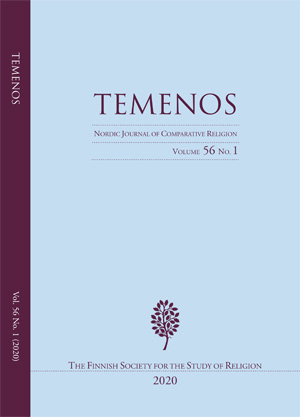Ricœur’s Historical Intentionality and the Great Goddess Freyja
Some Problems in the Phenomenology of Religion and Interpretations in the Study of Religions
DOI:
https://doi.org/10.33356/temenos.80350Keywords:
Historicity, Interpretation, Understanding, Context, Ricœur, Hermeneutic phenomenologyAbstract
The main question in this article concerns whether hermeneutic phenomenology as a methodology can address some of the problems and critiques raised in the study of religions. Inspired by Gilhus’s proposal in her article ‘The Phenomenology of Religion and Theories of Interpretation’, I investigate the possibilities in this strand of thought concerning interpretation and explanation from the perspective of Ricœur’s hermeneutic phenomenology and language theory, taking Norse mythology and the goddess Freyja as examples of how this method might work. I argue that Ricœur’s contribution to hermeneutic phenomenology is important to methodology in the study of religions, and that the historicity of the interpretation of religious phenomena is based on a lifeworldly intentionality. I also analyse the depth of understanding, the formation of ideas, and meaning in its historical context at the level of the historian’s process of interpretation, and I argue that the method may constitute a theoretical basis for an objective science.

Downloads
Published
How to Cite
Issue
Section
License
Copyright (c) 2020 Ane Faugstad Aarø

This work is licensed under a Creative Commons Attribution 4.0 International License.
Author's Guarantee
- The Author acknowledges that the Work will be publicly accessible on the Internet and that such access will be free of charge for the readers.
- The Author guarantees that the Work is her/his original work that has not been published before and cannot be construed as copying or plagiarism. Furthermore, the Author confirms that the Work contains no statement that is unlawful, defamatory or abusive or in any way infringes the rights of others.
- The Author confirms that she/he has secured all written permissions needed for the reproduction in the Publication of any material created by a third party.
User Rights
Under the CC BY 4.0 license, the Author/s and users are free to:
- Share — copy and redistribute the material in any medium or format,
- Adapt — remix, transform, and build upon the material for any purpose, even commercially,
- However, the Work must be attributed to the original Author and source of publication.
The license of the published metadata is Creative Commons CCO 1.0 Universal (CC0 1.0)
Author Rights
The Authors maintain the right to:
- copyright, and other proprietary rights relating to the Work,
- the right to use the substance of the Work in future own works,
- the right to self-archiving/parallel publishing (publisher's PDF allowed).
Rights of Publisher
- The Publisher reserves the right to make such editorial changes as may be necessary to make the Work suitable for publication in the publication, e.g. style of punctuation, spelling, headings and the like.
- The Publisher will publish the Work if the editorial process is successfully completed and reserves the right not to proceed with publication for whatever reason.
- The publication entitles the author to no royalties or other fees. This agreement will be governed by the laws of Finland.






